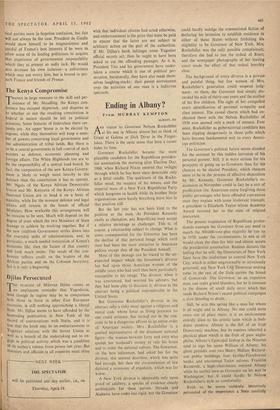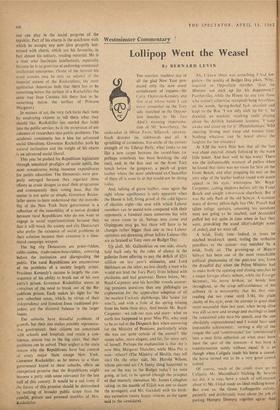Ending in Albany?
From MURRAY KEMPTON
ALBANY, NY
ANY visitor to Governor Nelson Rockefeller at his seat in Albany almost has to think of Grant at Galena or Dick Diver in the Finger- lakes. There is the same sense that here a career bides its time.
Governor Rockefeller became the most plausible candidate for the Republican presiden- tial nomination the morning after Election Day, 1960, when Richard Nixon entered that twilight. through which he has been since detectable only as a fitful candle. The quickness of the Rocke- feller mind, the majesty of his means, and the imperial mass of a New York Republican Party which burgeons in health while its brother State organisations seem barely breathing leave him in that position still.
But the last year has not been kind to the position or the man. As President Kennedy swells as champion, any Republican must accept a relative shrinkage as challenger. This is, of course, a relationship subject to change. What is more consequential for the Governor has been the decline of that personal image which until then had been the most attractive in American politics except that of the President himself.
Most of this damage can be traced to the un- expected impact which the Governor's divorce has had upon those American women of the Middle years who had until then been particularly susceptible to his image. The divorce, when it was announced, had worried his advisers, but they had been able to discount it, divorce in the abstract being a political imponderable in the United States.
But Governor Rockefeller's divorce, in the abstract only a risky essay against a religious and moral code whose force as living presence no one could estimate, has turned out in the con- crete to be a dangerous affront to an entire order of American society. Mrs. Rockefeller is a gentled representative of the dominant national figure—the woman between forty and sixty who spends her husband's money to rule his home and to order the national culture. The Governor, on the best inferences, had asked her for the divorce; this seemed desertion, which was quite bad enough, but then the circumstances of law dictated a ceremony of expulsion, which was far
WOTSC.
A New York divorce is obtainable only upon proof of adultery, a species of evidence clearly unthinkable for these parties. Nevada and Alabama have codes less rigid; but the Governor could hardly indulge the conventional fiction of declaring his intention to establish residence in either of those States. without forfeiting his eligibility to be Governor of New York. Mrs. Rockefeller was the only possible complainant; therefore she had to run the ordeal of Reno; and the newspaper photographs of her leaving court made the effect of that ordeal horribly clear.
The background of every divorce is a private and painful thing, but few women of Mrs. Rockefeller's generation could suspend judg- ment: to them, the Governor had simply dis- carded his wife of thirty-one years and the mother of his five children. The sight of her compelled every identification of personal sympathy and class interest. The casual charm which had en- chanted them with the Nelson Rockefeller of 1958 now seemed only a mask of menace. Ever since, Rockefeller as gubernatorial candidate has been slipping dangerously in those polls which have become fundamental writ to every Ameri- can politician.
The Governor's political future seems clouded for the moment by this sudden intrusion of his personal present. Still, it is more serious for his prospects of going on as Governor than for his chances to be elected President, which chances seem to be in the process of effective disposition by Mr. Kennedy. Governor Rockefeller's re- accession in November could in fact be a sort of purification rite. Americans enjoy forgiving those public personages who have offended convention once they expiate with some irrelevant triumph; a precedent is Elizabeth Taylor whose Academy Award restored her to the state of original innocence.
The present trepidation of Republican profes- sionals exempts the Governor from any need to match the 500,000-vote-plus majority he ran up in 1958; under the circumstances, to win at all would clean the slate for him and almost assure the presidential nomination. Realism dictates the feeling that he will; the Democrats of New York State have the misfortune to control New York City, which is either ungovernable or atrociously governed; any New York City Democrat seeking votes in the rest of the State carries the brand ot Gomorrah. The Governor, as an impulsive man, can make grand blunders, but he is immune to the disease of small daily error which has made Richard Nixon's recent political campaigns a slow bleeding to death.
Still, he acts this spring like a man for whom it all might end in Albany. No one could seem more out of place there; it is an environment entirely alien, to his artistic taste which is bull- dozer modern. Albany is the fief of an Irish Democratic machine, but its masters inherited a physical plant which is the fruit of pure anglo- philia; Albany's Episcopal bishop in the Nineties used to sign his name William of Albany; his ghost presides over two Henry Hallam Richard- son public buildings, four Gothic-Flamboyant banks, and uncounted Tudor saloons. Franklin Roosevelt, a high•churchman, enjoyed Albany while he tarried here as Governor on his way to Washington; but it could hardly fit Nelson Rockefeller's style so comfortably.
Even so, he seems suddenly, immensely persuaded of the importance a State carefully run can play in the social progress of the republic. Part of his charm is the quickness with which he accepts any new idea properly but- tressed with charts, which are his favourite, in fact almost his solitary, reading material. He is a man who fascinates intellectuals, especially' ' because he is so generous at endowing communal intellectual enterprises. (Some of the interest his mind arouses may be only an adjunct of the imperial -station of the Rocketellers; the most egalitarian American feels that there has to be something below the surface ot a Rockefeller the same way Jean Cocteau felt there had to be something below the surface of Princess Margaret.) In matters of art, the very rich form their taste by employing experts to tell them what they should like. Rockefeller has carried that habit into the public service; he is the proprietor of ant colonies of researchers into public problems. The academic community has a bias for advanced social liberalism; Governor Rockefeller both by natural inclination and the weight of his charts is an advanced social liberal.
This year he pushed his Republican legislature through unnatural prodigies of social uplift, the most conspicuous being immense expenditures for public education. The Democrats were pro- perly outraged because they regarded these efforts as crude designs to steal their programme and consequently their voting base. But the matter is not quite so simple. Governor Rocke- feller seems to have understood that the immobi- lity of the New York State government is a reflection of the immobility of a nation divided between rural Republicans who do not want to engage in social experimentation because they fear it will wreck the society and city Democrats who prefer the existence of social problems to their solution because their existence is a time- tested campaign weapon.
The big city Democrats are priest-ridden, rabbi-ridden, trade-union-boss-ridden, cowering before the institution and disregarding the public. The rural Republicans are unconscious of the problems of a society largely urban. President Kennedy's success is largely the con- sequence of his ability to break out of his own party's prison. Governor Rockefeller seems as conscious of the need to break out of the Re- publican prison. Each makes his fight for the new suburban areas, which, by virtue of their independence and freedom from traditional pre- judice, are the electoral balance in the larger States.
The suburbs have • dreadful problems of growth, but their size makes possible representa- tive government; their citizens are concerned with schools and 'hospitals and retain a con- fidence, almost lost in the big cities, that their problems can be solved. Their neglect is the main reason why the Republicans have lost control of every major State except New York. Governor Rockefeller, as he moves to a 'State government keyed to these suburbs, offers an unexpected promise that the Republicans might become a party with some relevance for the last half of this century. It would be a sad irony if the future of. this promise should be determined by nothing of broader public scope than the painful, private and personal troubles of Mrs. Rockefeller.



































 Previous page
Previous page